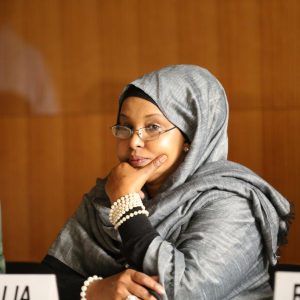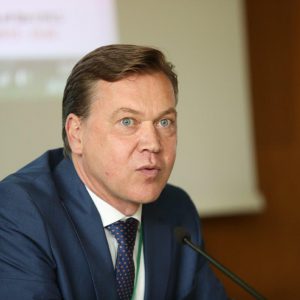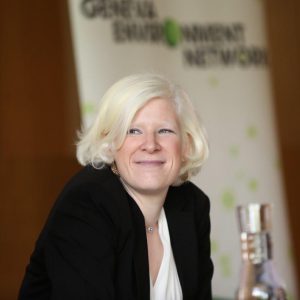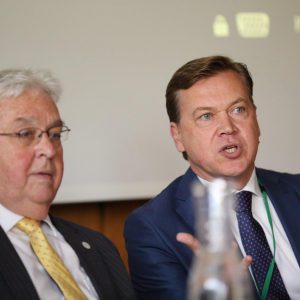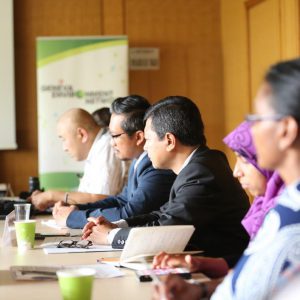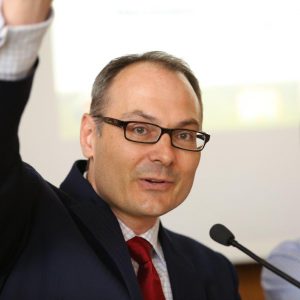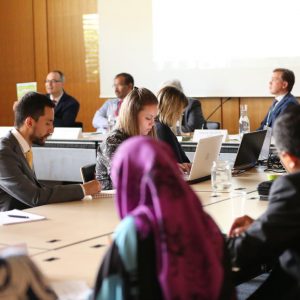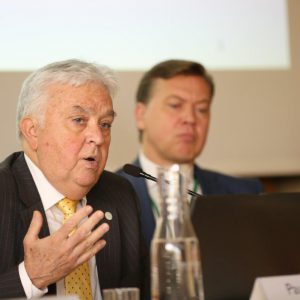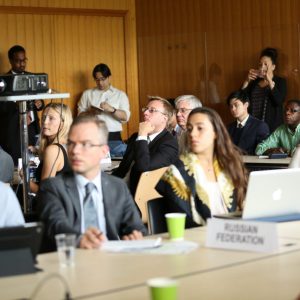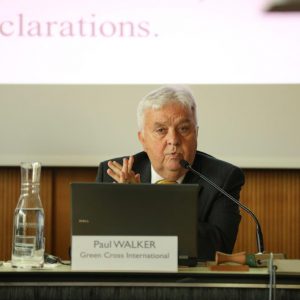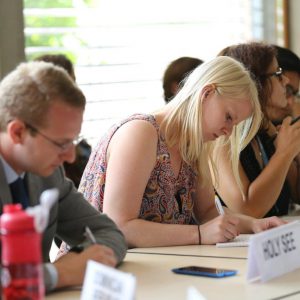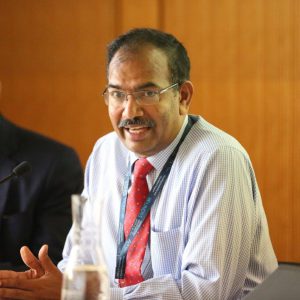Event
Discussing Chemical Weapons Abolition: Are We There Yet?

A discussion on chemical weapons, organized within the framework of the Geneva Environment Network, took place on Tuesday 26 July 2016, at the International Environmental House II. We had the pleasure to welcome two senior experts, Muralee Thummarukudy and Paul Walker.
Muralee Thummarukudy, Senior Programme Officer at UNEP, personally spent time in Syria during the chemical weapon destruction process that took place in 2014. At the request of the UN Secretary General, UNEP provided environmental expertise to the Joint UN-OPCW mission to destroy Syrian chemical weapons, and hence UNEP sent environmental experts to Syria in 2013-2014 to advise on environmental safeguards for all steps of the process, starting from transportation from the storage site, loading in the port of Latakia, to the final destruction aboard the US Ship Cape Ray.
Paul Walker is one of the most effective advocates for the abolition of chemical weapons. His leadership has helped to safely and verifiably eliminate more than 65,000 metric tons of chemical weapons from six declared national arsenals. He has been key to leveraging over one billion dollars annually in effective programmes for arms control, disarmament, threat reduction and nonproliferation. Paul Walker has engaged government leaders, NGOs, think tanks and citizens’ groups around the world to work towards full implementation of the Chemical Weapons Convention and for a world free from the dangers of chemical weapons. Paul was honored with the Right Livelihood Award, also called the alternative Nobel Prize.
Agenda
Welcome and Opening Remarks
Henrik SLOTTE,Chief, Post-Con ict and Disaster Management Branch, UNEP
Adam KONIUSZEWSKI, Chief Operating O cer, Green Cross International (Geneva)
Discussion
Paul WALKER, Director, Environmental Security and Sustainability programme, Green Cross International (Washingtion DC)
Muralee THUMMARUKUDY, Senior Programme Officer, Post-Conflict and Disasters Management Branch, UNEP
Q & A
Closing Remarks
Marie-Gaëlle ROBLES, Counsellor, Permanent representation of France to the Conference on Disarmament
Summary
Henrik SLOTTE welcomed the audiance and intoduced the main speakers.
Adam KONIUSZEWSKI in his introduction mentioned:
- Salute to colleagues that have done many events, and are partners involved with chemical weapons
- Paul Walker is at the center of Green Crosses mission.
- For those not familiar, Green Cross was founded right after the Rio Earth Summit.
- Green Cross has offices in over 30 countries, and practical projects in over 50 countries.
- Some activities are a spin-off of Walker’s program, one spin-off is the social and medical care program. Ex. 14-17 year olds from Fukushima to put together a theatrical play in Geneva to show the environmental and health issues caused by nuclear disasters. It is an opportunity for them to show this disaster, as well as go on a pleasure trip to enjoy time in a clean environment.
- Education is at the core of everything we are trying to achieve. 18 year old celebration of Environmental Diaries. Over 1.2 million kids have participated in this program.
Paul WALKER
- International Security is his background. His whole field was in arms control and disarmament. Anything to do with bilateral relations and multinational relations.
- One of hismost interesting trips was the first on site inspection of a Russian stockhold of chemical weapons. A small series of villages in Siberia, where there is a chemical weapon stockpile, everyone was really worried about it. This was in 1994 before a lot of terrorist activity. They were able to unilaterally destroy and secure stockpile. In the middle of no-where, on the Kazakhstan border, with a chain link fence and a 16 year old private that hadn’t been paid in a few months. Chief of site didn’t know the amount of weapons that were in this stockpile. Walker thought to himself this would be very dangerous and have a major impact if thousands of these weapons got into the hands of someone else somewhere around the world, This is what launched him into the field of chemical weapons.
- Last year, the 100th anniversary of the first wartimes that chemical weapons were used in World War I. Some are blinded or temporarily blinded, likely by mustard seed of some sort. “Chemical weapons were a major contributor to unjuries and death in WW1”
- Iranians are advocates of abolishing chemical weapons because of Saddam Hussein era of war.
- We are all struck (shocked) by how much tonnage existed during the 1993 convention. Biggest holders were Russia and US.
- Russia 40,000 metric tons,
- USA 28,000 metric tons.
- Estimate of worldwide tons of chemical weapons: 72,500 metric tons (estimately is widely used).
- 8 countries have declared chemical weapons stockpiles.
- Iran n/a on tonnage because there is still some leftover from the war that is not necessarily countable or accounted for.
- America’s stockpiles, 9 total, biggest one was in Tooele Chemical Agent. Today nearly all of these are gone and have been diminished relatively safe, if not completely safe. Pueblo Chemical Depot (Colorado) and Blue Grass Army Depot (Kentucky) still remain, Bluegrass is smaller.
- VX nerve agent, one sniff or one drip on your skin can kill you in about 2 minutes, which is why there is much effort in getting rid of it.
- For destruction in the US, worked very close with US military to close 7 stockpiles. 2 are in progress of going through systemics to ensure they are safe.
- For destruction in Russia, 6 stockpiles neutralized. Russians have done very well in neutralizing. Almost all gone today except for one. There has been a lot of democratic decisions made for Russians despite this not being what they are used to. The Russian process has gone much quicker than the US.
- Albanian joined chemical weapons convention unintentionally and realized oops we may have a stockpile. After testing the weapons they had they realized it was mustard agent. It was successfully destroyed.
- South Korea very reluctant to be recognized, want to remain a secret although most people know when they see an “unmarked country” on the list of stockpiles.
- India destroyed theirs but will not give any information about their stockpiles. There should be transparency in this because these are success stories when a country successfully eliminates their chemical weapons.
- Buried chemical weapons.
- In the US there are 250 suspected chemical weapons burial sites. Homes have been built over these sites yet chemical weapons have been discovered in backyards, front yards, and basements.
- Sea-Dumped Chemical Weapons.
- Tens of thousands of tons dumped in the Baltic Sea. Needs to be discussed about what to do in the future to clean these.
- Syrian Chemical Weapons.
- Neutralized weapons on the high seas. It is questionable if Syria has declared everything or if they have more weapons.
- Recent statements that there remains “gaps, inconsistencies, discrepancies” in Syria’s declarations.
- DAT that is ongoing and looking into almost a complete lack of evidence.
- There have been about 4-5 new chemicals in Syria. None of which were claimed in Syria’s declarations.
- All non-member states must join the CWC – Egypt, Israel, North Korea, and South Sudan. Also, Taiwan (cannot be inspected but is one of the biggest producers.
- Protection of the environment, public health, and workers safety in weapons demilitarization processes is an absolute necessity, trumping budget deadlines.
- For program success there must be transparency, stakeholder investment, public dialogue, and consensus building. There was a bit of frustration with Syria and its situation on lacking declarations.
- Green Cross is very committed to the abolition of chemical weapons.
Questions:
- Depleted Uranium
- Programme of education – importance of education
- Longer-term strategic vision to help OPCW reach out to communities.
- Challenge inspection provisions within the convention to be activated by the member states (not initiated by the secretariat).
- DAT – declaration assessment teams
Closing remarks
- Chemical weapons regime is quite a strong one – made these successes possible
- Echo the need for clarification on gaps and discrepancies in the Syrian declaration
- Challenges still remain
- Challenge that needs to be tackled – the use of chemical weapons – responsibilities, need to identify the perpetrators and hold them accountable
- Requires concerted efforts of the international community
- Environmental dimensions – showed that it cannot be taken in isolation from a more broader security and disarmament process
- Fact-finding mission & joint investigative mechanism
More information and documents
Videos:
- Paul Walker: https://www.facebook.com/GenevaEnvironmentNetwork/videos/10155278203908018/
- Muralee Thummarukudy: https://www.facebook.com/GenevaEnvironmentNetwork/videos/10155278252668018/
- Closing remarks: https://www.facebook.com/GenevaEnvironmentNetwork/videos/10155278334768018/
Links:
- OPCW: https://www.opcw.org
- OPCW joint mission in Syria: http://opcw.unmissions.org/
- Green Cross International and Cemical Weapons destruction: http://www.gcint.org/chemical-weapons-destruction/
- Paul Walker & the Right Livelihood Award: http://www.rightlivelihood.org/walker.html
https://www.genevaenvironmentnetwork.org/wp-content/uploads/2020/05/invitation_26_july_2016f.pdf
https://www.genevaenvironmentnetwork.org/wp-content/uploads/2020/05/gci_geneva_072616.pdf


